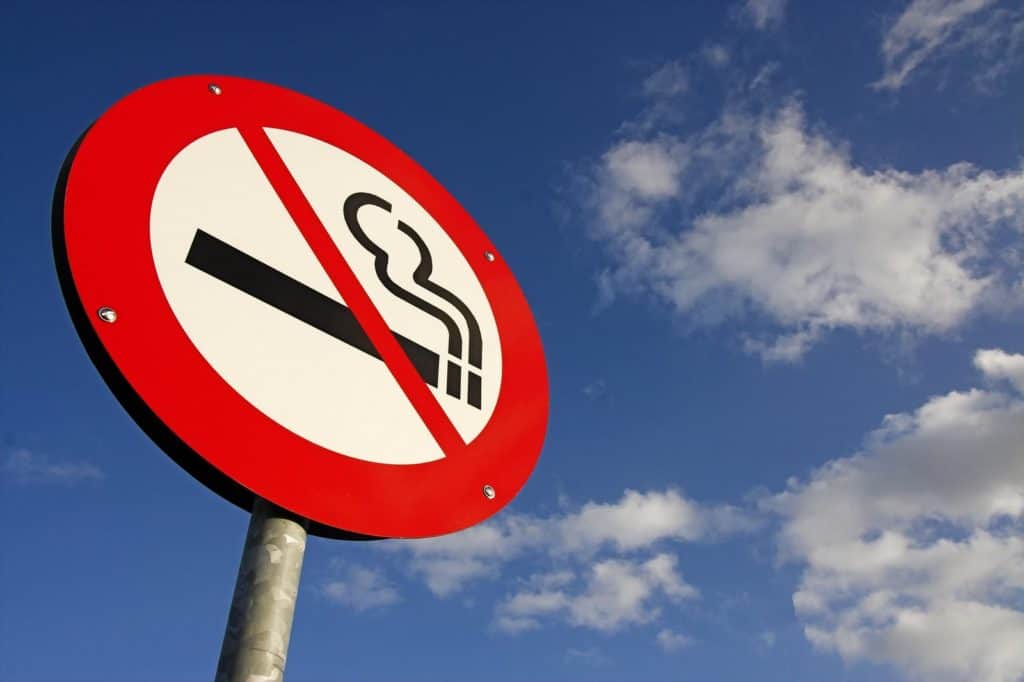
By Dan Murphy
The vote last week by the New York Assembly to raise the age to purchase all tobacco products from 18 to 21 has the state on track to become the eighth state to raise the age to 21 across the country.
Many groups are in favor of the Tobacco21 movement, including the American Lung Association.
“Tobacco is a highly addictive product, and close to 95 percent of smokers try their first cigarette by the age of 21,” said Elizabeth Hamlin-Berninger, director of advocacy in New York for the American Lung Association. “With youth e-cigarette use already at epidemic levels, raising the age of sale to 21 would be a significant victory for public health and in the interest of protecting our young people from a dangerous and lifelong addiction.
“More than 28 percent of New York high school students reported using tobacco products in 2017 and the use of e-cigarettes by our youth is an epidemic that demands bold action,” she continued. “With adolescents and young adults proving to be uniquely vulnerable to the effects of nicotine and nicotine addiction, we must not delay this important, life-saving legislation any longer. In fact, the National Academy of Medicine (formerly the Institute of Medicine) found increasing the minimum age of sale for all tobacco products to 21 could prevent 223,000 deaths among people born between 2000 and 2019, including 50,000 fewer dying from lung cancer – the nation’s leading cancer killer. Some of those children are New York’s children – and this legislation might just save their lives by stopping them from using tobacco before they start.”
The bill in the Assembly passed by a 105-23 vote. It was sponsored by Assemblymember Linda Rosenthal, who said: “People know that tobacco and the nicotine can cause your death. It’s a great public cost, but it is a great cost to individuals and families when they’ve picked up the habit.”
Some Assembly republicans who voted against raising the age questioned how New Yorkers could vote and serve in the military at 18, but if this law passes, they would not be able to buy tobacco.
Another question is whether the new law would apply on Indian reservations in the state. There will be no enforcement on tribal lands.
The bill now moves to the State Senate, where it is expected to pass, and then to Gov. Andrew Cuomo, who supports the measure. “The lifelong health effects and human misery caused by tobacco use cannot be understated and New York needs to do everything in its power to keep tobacco products out of the hands of our young people,” said Cuomo.
Seven other state, including Massachusetts and New Jersey already have raised the legal age to buy tobacco products to 21, and the neighboring states of Vermont and Connecticut are moving toward tobacco 21.
Some local governments and counties in New York have already raised the age to 21, including New York City and Onondaga County. Westchester County is considering raising its age to 21.
Well organized groups like Tobacco21 have argued that tobacco belongs with alcohol, handgun purchase, casino gambling, concealed-carry and, where legal, recreational marijuana sales, all of which have a legal age of 21 to purchase of tobacco. Three quarters of Americans, including 70 percent of smokers, also agree to an age of 21 for tobacco purchase.
According to Tobacco21.org, for hundreds of years, including 200 years of American constitutional law, the age of legal adulthood in this country was 21. After the Vietnam War, the voting age was lowered to 18. The alcohol industry used that opportunity to press legislators to lower the drinking age to 18 in about half of U.S. states. The result was a conflagration of fatalities caused by youthful drinkers. Finally, President Reagan persuaded Congress to force all states back to 21.
Another argument on the website and across the country about Tobacco21 is the use and abuse by younger students of electronic cigarettes, or vaping. Doctors Michael Salem and Thomas Ylioja wrote on tobacco21.org: “When electronic cigarettes first came on the market, we hoped they might help reduce the tremendous harm caused by tobacco cigarettes. If smokers inhaled a vapor containing nicotine, flavorings and other additives rather than the multitude of cancer-causing chemicals in tobacco smoke, there might be some benefit.
“While some adults have used e-cigarettes to wean themselves from tobacco, research indicates that e-cigarettes are really just another nicotine delivery device with its own unique hazards that addict users to nicotine. This is especially concerning for teens and young adults who are using e-cigarettes with alarming frequency.
“One recent study did suggest that e-cigarettes helped adults stop smoking. However, those who quit tobacco continued to consume e-cigarettes and nicotine a year later. More common appears to be the experience of smokers studied by Dr. Russell Bowler, a professor of medicine at National Jewish Health. He found that most of the tobacco smokers who started using e-cigarettes in hopes of quitting tobacco continued to smoke tobacco at similar or higher levels five years later. Former smokers who began using e-cigarettes were more than 16 times as likely to resume tobacco smoking.
“Additional research at National Jewish Health has shown that, while less harmful than tobacco smoke, e-cigarette vapor itself is harmful. It injures cells lining the airways and blood vessels in the lungs, and increases susceptibility to respiratory viruses.
“E-cigarette use, or vaping, by teens and young adults is especially worrisome. After decades of decline, the consumption of tobacco products has taken a U-turn and begun a precipitous climb. Vaping among middle and high school students increased 900 percent from 2011 to 2015 and nearly doubled in just the last year.
“Today, one in 20 middle schoolers and one in five high school students use e-cigarettes. College students and young adults vape at similar or even greater rates.
“Research has shown that youth who try an e-cigarette are more likely to begin smoking tobacco. The surgeon general and the Food and Drug Administration have both called e-cigarette use by teens and young adults a serious public health threat.
“Nicotine in e-cigarettes poses unique threats to young users’ health. Adolescence is an important period of brain development when learning capacity, decision making, working memory, reward processing and emotional regulation all grow and mature. Nicotine use during adolescence profoundly alters this process, priming the brain for future addictions and increasing the risk of mood disorders, intellectual problems and impulsiveness.
“E-cigarettes have become immensely popular, fueled by flavors and marketing targeted at young people. Peer pressure to vape is bearing down on those who don’t. Many don’t even realize they are vaping nicotine and mistakenly believe they are inhaling simple water vapor. Teenage brains are especially susceptible to nicotine’s addictive and rewarding effects, yet many fail to recognize the threat e-cigarettes pose to long-term mental and physical health.
“After decades of fighting to reduce harm from tobacco, it is astounding that a new generation faces a renewed threat from tobacco. We must help young people avoid nicotine and quit e-cigarettes…
“… At the same time, the FDA must tighten regulation of e-cigarettes and follow through on promises to close down manufacturers who don’t meaningfully limit youth access to e-cigarettes.
“JUUL, the dominant company in the market, must follow through on its action plan to cease marketing to youth and limit their access to its products. Together, we can protect our youth from the dangers of e-cigarettes and vaping.” (Salem is president and CEO of National Jewish Health and Ylioja is assistant professor of medicine and clinical director of health initiatives at National Jewish Health.)
As New York comes closer to raising the age to buy tobacco to 21, opposition to efforts to legalize the sale of marijuana in New York continue. The New York Catholic Conference on Wednesday said it opposes the legalization of marijuana in the state, worries the move would “exploit addiction,” and stresses that it should not be used as a vehicle for economic development.
“The Catholic Church is not prohibitionist, but at the same time we believe the government should not be encouraging destructive behavior, whether gambling or drug use, to raise revenue,” state the NYCC. “Vice is not an appropriate economic development engine for a state that prides itself as a national progressive leader.
“Studies appear to show racial and ethnic disparities in enforcement of marijuana possession, and we take this issue seriously. The state can and should take appropriate measures to ensure that skin color or zip code do not result in different outcomes for the same offense, including re-evaluating the justice of current criminal penalties for low-level possession. At the same time, we must not simply throw up our hands and legalize a harmful substance in order to declare the problem of discrimination solved.”
Ever since Cuomo indicated that he would include legalizing marijuana sales in his budget proposal, leaders in the Senate and Assembly have yet to agree with the governor on the details, including how the anticipated $300 million per year in revenue from its sales would be used.
The Town of North Castle is the latest Westchester community to explore ways to restrict marijuana sales if it becomes legal in the state.
The measure would also include restricting e-cigarette sales and amending its zoning code. Similar restrictions to cabaret and adult entertainment uses are also in North Castle’s zoning code and have been deemed legally permissible by the courts.
Limiting the sale of marijuana and e-cigarettes to areas at least 500 feet from a residential district – or a church, school or park – are also likely to be a part of North Castle law, and are already a part of the discussion in the Town of New Castle to do the same. New Castle already has a law restricting the opening of vape stores and can amend that law to include marijuana sales.
Local governments need to be wary of completely banning the sale of marijuana if legalized. That would likely result in court challenges to the law, as is the case already on Long Island after the Town of North Hempstead outlawed the sale of pot even before state lawmakers legalized it.





